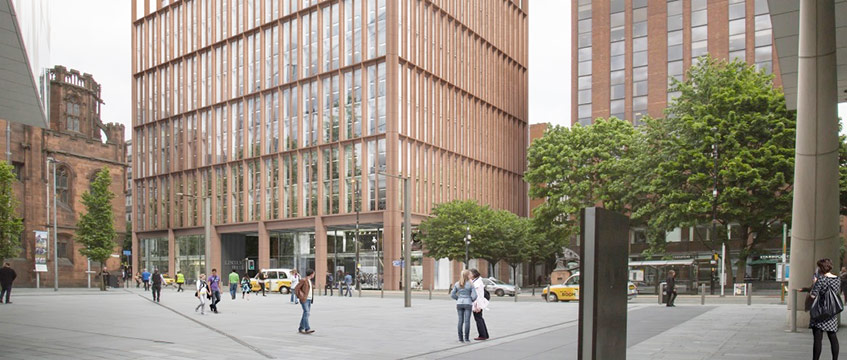WeWork has started seeking investment opportunities in Manchester after a leasing deal at Worthington Group’s 125 Deansgate (pictured) fell through.
The flexible office provider had been under offer to take about 45,000 sq ft at the 116,000 sq ft office development but negotiations failed, with the landlord concerned about how WeWork could affect the value of the building.
With WeWork’s ability to lease property under question, multiple Manchester agents and developers say that the company has begun to look at acquiring property in the city. Last week the co-working giant sent a team to Manchester to look at potential investment opportunities.
If WeWork does start acquiring office space in Manchester, it would be in line with its strategy in other cities, where it begins by leasing space before owning it.
In London, for example, the company bought Devonshire Square for £580m with TH Real Estate and Dutch pension fund PFA Ejendomme last April.
Why now?
WeWork has expanded rapidly in Manchester over the past two years and, according to agents throughout the city, the company is showing no signs of stopping.
However, as the 125 Deansgate deal shows, landlords are still cautious about letting to WeWork.
One developer in the city said: “If you have a big building, then no more than a third, at most, should be let to them. That’s the rule of thumb that a couple of institutions have said to us.”
A Manchester agent suggested WeWork’s footprint could reach up to 50% and still have a positive impact in the value of a building but any more would feel “too dominating”.
WeWork sets up special-purpose vehicles when it leases buildings, and some landlords are worried that, in a worst-case scenario, the company could have the option to fold those SPVs if there is an economic downturn or if the company has negotiated rent-frees that come to an end.
Those concerns hark back to the last downturn, when Regus followed a similar strategy. In 2010, EG reported that Regus had warned landlords that some of the vehicles it had set up to lease buildings might go into administration if rents were not cut, which would leave buildings without a tenant.
“It doesn’t help what happened to Regus 10-15 years ago, when it folded newcos [corporate spin-offs] it created on each building,” an investment agent in Manchester said. “It really screwed a lot of landlords over, and that’s still in a lot of investors’ minds.”
He added that buying offices would probably be “more of a necessity” for WeWork and would allow it to avoid landlords who might still be spooked from what happened to serviced offices a decade ago.
Business model
Some agents and landlords in the city have also privately said that WeWork has expanded so quickly that it does not yet know how its business model will work in the long term or how strong its covenant is.
With limited new grade-A stock in the market – 125 Deansgate and Barings’ 180,000 sq ft Landmark building are the two major offices set to complete this year – landlords are hoping to attract what they perceive to be less-risky options into their buildings.
More second-hand and refurbished stock does mean there is a glut of options for serviced office providers that might not satisfy the demands of prime office landlords. Dalton Place is a clear example of that: WeWork was able to take a lease on all the office space in the building. EG reported in September that the firm was in talks to lease Tesco Pension Fund’s 66,000 sq ft Dalton Place. Last month, WeWork confirmed that this will be the first building it will fully occupy in the city.
Completing its deal at Hyphen would further prove that Manchester’s landlords still trust – and want – the WeWork covenant. The firm is in talks to take space at Boultbee Brooks’s 51,000 sq ft Hyphen building.
WeWork’s setback at 125 Deansgate does, however, come amid wider issues for the company. For instance, Japan’s SoftBank cut its planned $16bn (£12.2bn) investment in WeWork to $2bn at the start of the year. Still, that investment valued the company at a whopping $47bn, giving WeWork the fire power to continue expanding without being beholden to cautious landlords.
WeWork declined to comment on its plans in Manchester, but a press spokesperson added: “Around the world, the company engages in various deal structures when it comes to real estate, from management agreements and freeholds to participatory leases and traditional leases. We have a diverse portfolio, and this trend will continue in the years to come.”
To send feedback, e-mail karl.tomusk@egi.co.uk or tweet @karltomusk or @estatesgazette











